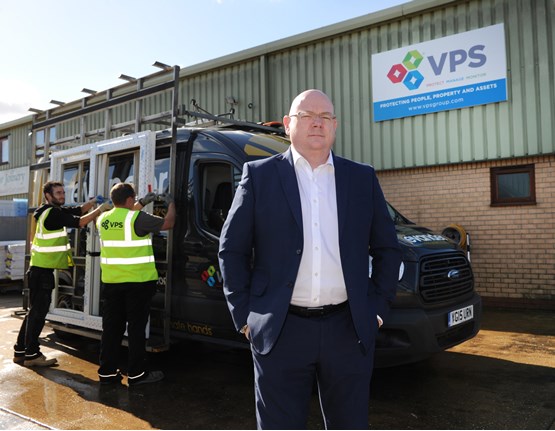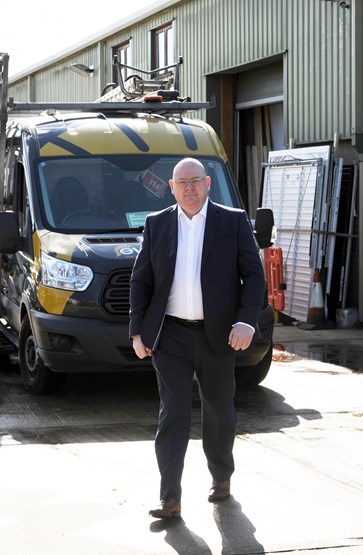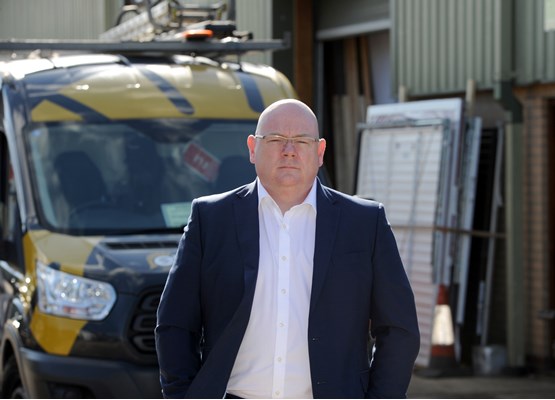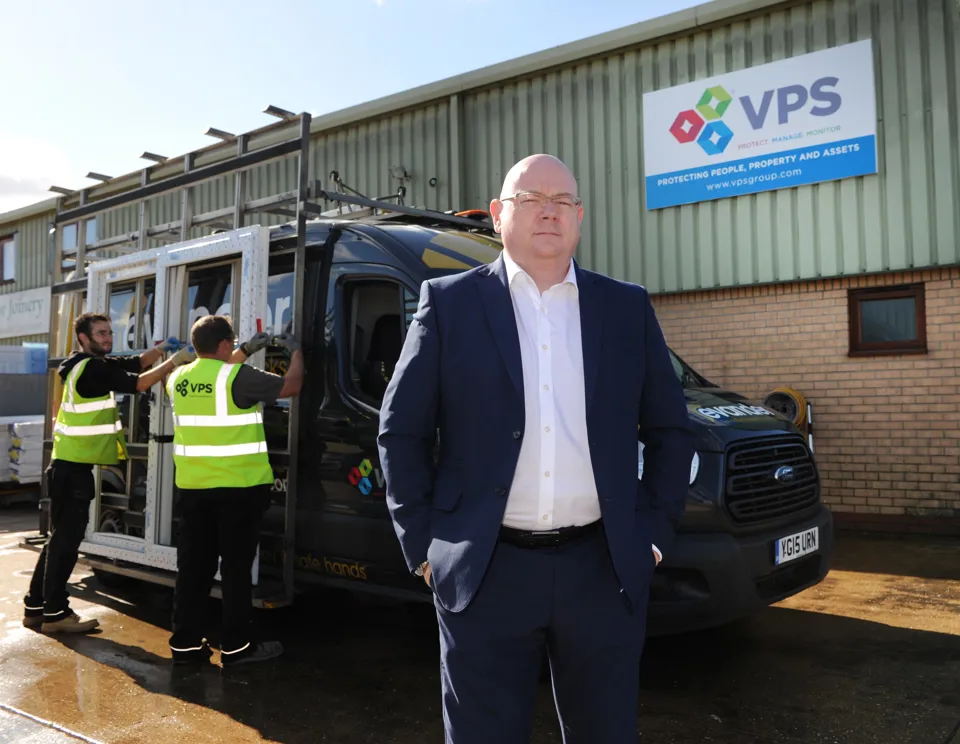VPS Group fleet manager Steve Mulvaney has big ambitions for his first full-time fleet role, and reveals why he wants to be "best in class", by John Maslen.
For any fleet manager taking on a new role, the ‘to do’ list can be daunting, but Steve Mulvaney hasn’t been deterred from setting his sights at the highest level.
He took over as the new head of fleet at the end of last year for an expanded VPS Group after it acquired Evander Glazing and Locks. VPS is a specialist provider of vacant property and site security solutions.
In his new role, Mulvaney was challenged with integrating two separate fleets with disparate policies, creating a cohesive new strategy for its 607 vehicles, assessing the fleet, which was spread throughout the country, while also reviewing manufacturers, leasing providers and a range of service companies, in addition to managing day-to-day fleet issues.
But in his first meeting with one of his key suppliers, Fleet Service Great Britain (FSGB), Mulvaney left no doubt about his ambitious approach to the role.
He says: “I was asked where I saw the VPS fleet going and I said we want to be the best in our industry.
"We want to be able to sing from the rooftops to customers about how this fleet is looked after, with the most cost-efficient, cleanest vehicles and the safest drivers.
"I want to have the greenest, safest fleet, with the best trained drivers, the best-looking vehicles and overall a ‘best in class’ fleet.”
Despite this being his first full-time fleet role, Mulvaney’s previous job as an operations director meant he was responsible for a 70-vehicle van fleet.
He relished the chance to have a more hands-on approach to running a fleet. This hadn’t been possible when it was simply part of a wider role.
Mulvaney hasn’t wasted any time in making changes. He has already developed a three-year strategy which has been submitted to the board and approved, kick-starting a comprehensive fleet renewal programme.
This involved a substantial tender for commercial vehicle suppliers that saw all the major suppliers reviewed and a new manufacturer introduced to supply the 488-strong van fleet.
The separate fleets had both run Ford vehicles but, during an extensive tender process, Mulvaney introduced Peugeot as its panel van provider, supplying Partner, Expert and Boxer models, with Ford remaining as the provider of tippers.

He said: “Peugeot had a good offering when we looked at total cost of ownership with FSGB.
"Engineers love them as they are fitted with air conditioning and satellite navigation, all the equipment a driver really wants, and that was part of a competitive deal.
“The feedback on the vans is very good. They are new on the road, so it’s early days, but there have been no issues. We will roll them out and see how we get on.”
The fleet now operates on a five-year, 150,000-miles replacement cycle, historically used by VPS Group but longer than the four years/100,000 used at Evander, so, as part of the supply arrangement, VPS Group agreed extended warranties and breakdown cover.
Manchester-based VPS Group secures more than 50,000 properties and employs 1,500 staff in locations across the UK and mainland Europe, many of them in urban areas, so the review also included an assessment of low-emission zones and potential diesel bans during the life of the diesel-fuelled fleet.
Mulvaney says: “The research I have seen indicates diesel is still the best option for the next five years, particularly when you include the impact of AdBlue.
"However, this does mean training the drivers so they understand it and what they need to do. As low-emission zones come into force, we may need to swap vehicles around to take legacy vans out of London, but we have that on the radar.”
A review of the car fleet has brought fewer changes, as both companies had a broadly similar approach when it came to brands. Drivers are offered models from Audi, BMW, Ford, Mercedes-Benz and Volkswagen dependent on grade.
For Mulvaney, the key is ensuring vehicle grades reflect the diverse needs of the workforce. A new policy provides a range of vehicle types per group, chosen with wholelife costs and P11D in mind.
He says: “We try to offer a range of cars for different lifestyles, so an Audi A3 S Line might be offered for some employees, while a Ford Mondeo estate caters for people with families in the same banding.
"We have a base specification which includes leather for durability and cleaning, satellite navigation and Bluetooth.”
VPS Group historically bought all its vehicles. But, following the acquisition, it has adopted Evander’s policy of purchasing vans and leasing cars, albeit with a new supplier – Lombard Vehicle Management, under a policy led by the finance department.
There is also a small grey fleet where drivers have opted for a cash allowance, typically because employees don’t cover enough business miles.
As part of the business review, Mulvaney has analysed the impact of the new optional remuneration arrangements introduced this tax year that see company car tax charged on the higher of the benefit-in-kind (BIK) value of the car or a cash option (when offered), to ensure there are no problems.
He also has policies in place so grey fleet drivers’ licences are checked and that the business has a copy of their business insurance and MOT. If there are any omissions, the issue is brought straight to him.
VPS Group has expanded its business partnership with FSGB that began two years ago to include accident and risk management.
This is in addition to support with vehicle maintenance, rental management and services related to taxation and fine payment.
FSGB’s Achieve driver management system is the hub of VPS Group’s work-related road safety programme, which measures driver performance and compliance, including driving licence and vehicle checks.
On the road, vehicles are monitored using telematics, which assists with driver management and for some parts of the fleet provides route planning and supplies customers with accurate waiting times for engineers, based on the vehicle’s location.

VPS Group fitted all cars and vans with tele-matics, while Evander only equipped commercial vehicles with tracking devices. But Mulvaney is keen to establish a common approach.
He says: “Moving forward it will be fitted to all our vehicles. It is a valuable tool for training and guidance.
"If you look at drivers who are in the worst 20% of performers, it tends to be car drivers, rather than van drivers, when it comes to speeding, harsh acceleration and braking.
“We can then use this data for education. For example, we can show that speeding in urban areas just doesn’t work. The only thing that happens is you make it to court quicker to lose your licence.
“Hard braking and acceleration just increases emissions and stores up higher service, maintenance and repair costs further down the road.
"It is not Big Brother, just assets being looked after and educating drivers about vehicle use.”
Education extends to tackling distractions in vehicles, particularly hand-held mobiles.
He adds: “We take a zero-tolerance approach to hand-held mobile phone use, from the managing director down.
"We don’t want to see any notices of intended prosecution and we will discipline people who don’t follow this rule.”
If the company receives a complaint from a member of the public, a formal investigation is carried out, with Mulvaney acting as an independent participant separate to any management structures.
He says: “Improving the safety of all our drivers and the fleet is a key priority for VPS with driver education critical to safety and cost management.”
The next step is to consolidate the legacy telematics systems that provide driver insights.
There are currently a total of five suppliers across the different company fleets. A data analyst works through the separate feeds to generate consolidated reports.
Mulvaney adds: “Our ultimate goal is for all the data to filter through the FSGB platform to give us a complete overview of our fleet performance.”

Tender an ‘eye-opener’ to differing service levels
In the search for a new supplier, some companies were just not interested in winning business from the 600-vehicle fleet, according to Steve Mulvaney, head of fleet at VPS Group.
During the search for a new manufacturer, some contacts simply failed to turn up for arranged meetings to discuss their proposition, leading to them being struck off the choice list.
He says: “I was surprised at the lack of interest from some manufacturers. It was eye-opening. We had a couple of meetings arranged with suppliers where they just did not turn up.
“It gives you an idea that they really don’t care. It was an order for 75 vehicles, but there were potentially 600 on offer. As a result, I have never gone back to them.”
Data leads the way in driving down costs
Data is driving savings on the VPS Group fleet with vehicle performance insights informing actions that bring down costs.
Using the FSGB Achieve programme, data from a variety of sources is fed into a central database.
This includes data from a driver app that supports employees by ensuring a weekly vehicle check is undertaken.
Driver performance data comes from a variety of sources including telematics, details of any fines and accident history.
Steve Mulvaney, head of fleet at VPS Group, says: “The driver app benefits VPS by allowing us to carry out full vehicle inspections both scheduled and ad-hoc at the touch of a button.
“This information is uploaded into the customer portal for immediate review. Additionally, drivers can now book service, tyres and glass requests direct on the app.
“It is excellent technology, seamlessly delivered.
“VPS is now able to manage its driver-influenced costs through Achieve. We are receiving some excellent information on all aspects of the fleet.”
At the same time, the company is using data to closely monitor service, maintenance and repair (SMR) costs, which, combined with a strong risk management policy, is pushing down the pence per mile cost of running vehicles.
All VPS vehicles have SMR work undertaken through FSGB’s nationwide independent garage network.
When FSGB took over maintenance management of the fleet in 2015, the pence per mile operating costs on a sample of 176 vans was 5.12p per vehicle.
That figure is now 5p per vehicle per mile across a sample of 196 vans – a 2.3% cost reduction, through better purchasing and reduced servicing requirements.

















Login to comment
Comments
No comments have been made yet.